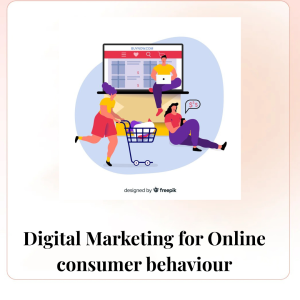
Online Consumer behavior in 2025 is effectively managed by digital marketing that focuses on user intent and their need . As we step deeper into 2025, businesses are recognizing that managing online consumer behavior is the key to building brand loyalty, optimizing conversion rates, and staying ahead in competitive markets. With rapidly evolving technologies like AI, machine learning, and data analytics, digital marketing strategies have become more intelligent and customer-centric than ever before.
This blog explores how digital marketing has adapted in 2025 to monitor, interpret, and influence online consumer behavior, turning every click, scroll, and purchase into valuable insights that shape business growth
What is Online Consumer Behavior and Its Role in Digital Marketing
Online consumer behavior refers to the actions, decision-making processes, and patterns of user behaviour online as they interact with products or brand—whether it’s browsing a website, clicking on an ad, reading reviews, or making a purchase. It includes:
- Search queries
- Social media engagement
- Email open rates
- Product preferences
- Abandonment of carts
- First User impression
In digital marketing, understanding these behaviors helps brands tailor their strategies for better targeting, personalization, and engagement. By analyzing online consumer behavior, marketers can identify what motivates their audiences, when they are most likely to convert, and what kind of messaging drives action.
For example, a consumer who frequently searches for eco-friendly products and follows sustainability influencers on Instagram might be more responsive to green marketing messages. Digital marketing allows businesses to tap into such behaviors with precision and show that user the similar content to drive him.
Challenges in Managing Online Consumer Behavior in 2025
1) Wrong Targeting
One of the most common challenges is targeting the wrong audience. With millions of users online, brands often fail to refine their targeting criteria. When a campaign is shown to users with no interest in the product or service, it leads to poor engagement rates and wasted ad spend. Suppose Beef is promoted in India then they are not likely to purchase it based on different culture or taste.
2) Lack to Know Right Intent of Audience
Understanding the actual intent behind user actions is difficult. For instance, a user visiting a product page may not be ready to buy; they could be comparing prices or just browsing. Without proper tools to assess user intent, marketers may misinterpret signals and create campaigns that miss the mark as If user do not enquire but is present on website for long time then ignoring him and lacking to provide follow-up message is a loss as main intent is not focused.
3) Weak Customer Research
Inadequate or outdated customer research leads to generalized personas. If marketers rely on static demographics instead of dynamic behavioral data, they miss out on capturing real-time preferences. This can result in bland messaging and reduced personalization. Suppose data driven decision is not focused based on user behavioral trends then it cannot meet needs of online consumers.
4) Missing Targeted Information
Sometimes, brands fail to provide targeted and relevant information that users are actually searching for. A blog post may lack specific answers, or a landing page might not showcase user reviews or comparison tools—elements critical to influencing online consumer behavior. Suppose user is searching for 3 BHK flats and campaign if lacks this keyword in heading then user may leave without taking action.
How Digital Marketing Effectively Manages Online Consumer Behavior
AI-Powered Personalization
Advanced AI tools analyze user behavior in real time to deliver hyper-personalized content, offers, and product recommendations at right time. From dynamic website content to customized email campaigns based on online consumer behavior boosts engagement and conversions.
Behavioral Segmentation
Digital marketing platforms now segment users not just by age or location, but by behavioral traits such as browsing history, interest and product preference, cart abandonment patterns, content interaction, and more. This allows marketers to build micro-segments and deliver tailored messages at each touchpoint to right audience leading to matched online consumer behavior.
Predictive Analytics
With the rise of machine learning, predictive analytics tools forecast future consumer actions based on past behavior. Marketers use these insights to anticipate customer needs and launch timely campaigns—often before the customer even expresses intent so that customer has access to right campaign that can satisfy his particular need.
Multi-Channel User Journey Mapping
Managing online consumer behavior requires mapping the entire customer journey across multiple channels—social media, websites, email, search, and mobile apps. Digital marketing ensures a consistent experience across platforms, keeping users engaged throughout the funnel maybe engaging on social media channels or website.
Interactive Content & Engagement
2025 has seen a massive rise in interactive content like quizzes, polls, AR filters, and product configurators. This content helps marketers understand real-time user preferences while keeping engagement high. It also provides data points to refine online consumer behavior strategies.
Feedback Loops
Modern marketing teams leverage real-time analytics to monitor user feedback and adjust strategies instantly. They also use tools to collect user feedback through surveys and reviews which help in continuously adapting to consumer behavior trends and meeting online consumer expectations.
Ethical Data Practices
In 2025, consumer trust is non-negotiable. Brands must be transparent about data usage, respect user privacy, and comply with global data regulations. Ethical handling of user data fosters trust and improves the quality of insights collected from online consumer behavior.
Conclusion
In 2025, online behavior has become more dynamic, unpredictable, and deeply integrated with technology. But with the right digital marketing tools and strategies, businesses can not only track and understand consumer behavior but also influence it in meaningful, ethical, and data-driven ways.
By staying agile, prioritizing personalization, and respecting consumer privacy, brands that manage online consumer behavior effectively will be the ones leading the digital marketplace of tomorrow. Hence choose Digital Marketing Agency in Dubai that handle your Online consumer behavior and manage your marketing operations. To Know more visit Osumare, Top Digital Marketing Company in Dubai.

